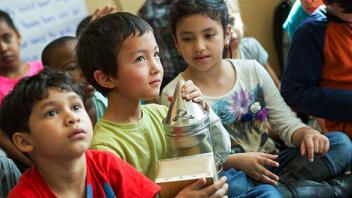What is second language acquisition?
Second language acquisition, or sequential language acquisition, is learning a second language after a first language is already established. Many times this happens when a child who speaks a language other than English goes to school for the first time. Children have an easier time learning a second language, but anyone can do it at any age. It takes a lot of practice!
What is the best way to teach a second language?
There are many different things that factor into the decision about how to teach a person a second language, including the following:
- language spoken in the home
- amount of opportunity to practice the second language
- internal motivation of the learner
- reason that the second language is needed (e.g., to learn at school, to talk to a friend, or for work)
There are different ways that to introduce the second language:
- by setting (e.g., English is spoken only in the school, and Urdu is spoken only in the home)
- by topic (e.g., French is spoken only during meal time, and Spanish is spoken during school/work activities)
- by speaker (e.g., Mom will speak only in German, and Dad speaks Russian only)
The ability of a person to use a second language will depend on his or her family’s ability to speak more than one language. It is important for parents/caregivers to provide a strong language model. If you cannot use the language well, you should not be teaching it.
How can a speech-language pathologist help?
A speech-language pathologist (SLP) can provide elective services for individuals who are learning English as a second language. These services are not covered by insurance.
The Preferred Practice Patterns for the Profession of Speech-Language Pathology outline the common practices followed by SLPs when engaging in various aspects of the profession. The Preferred Practice Patterns for elective communication modifications are outlined in sections 31, 32, and 33.
What other organizations have information about second language acquisition?
Reprinted with permission from Learning More Than One Language (2008). Available from the Web site of the American Speech-Language-Hearing Association: http://asha.org/public/speech/development/second.htm. All rights reserved.
